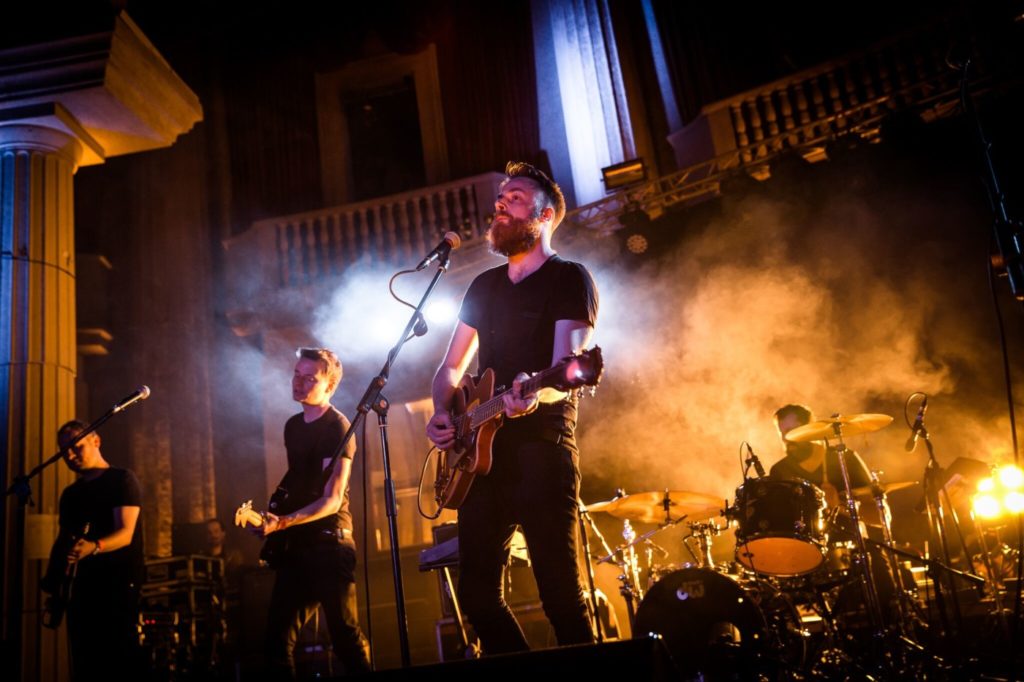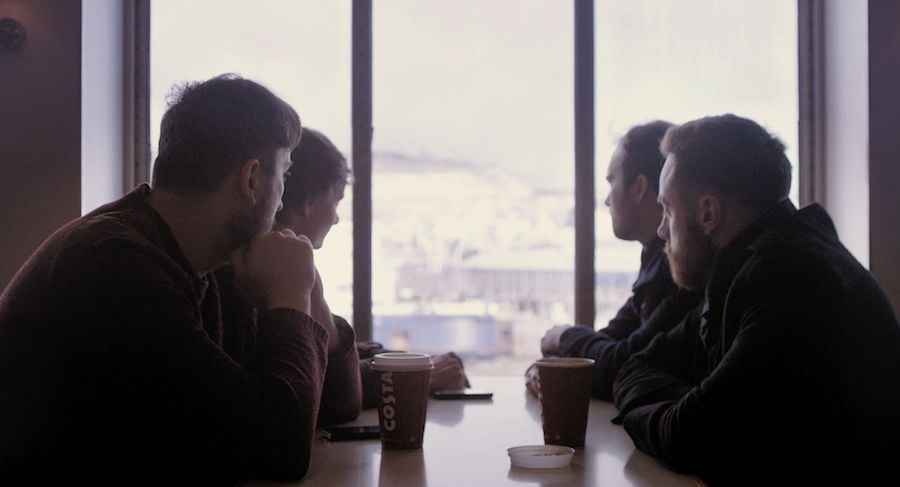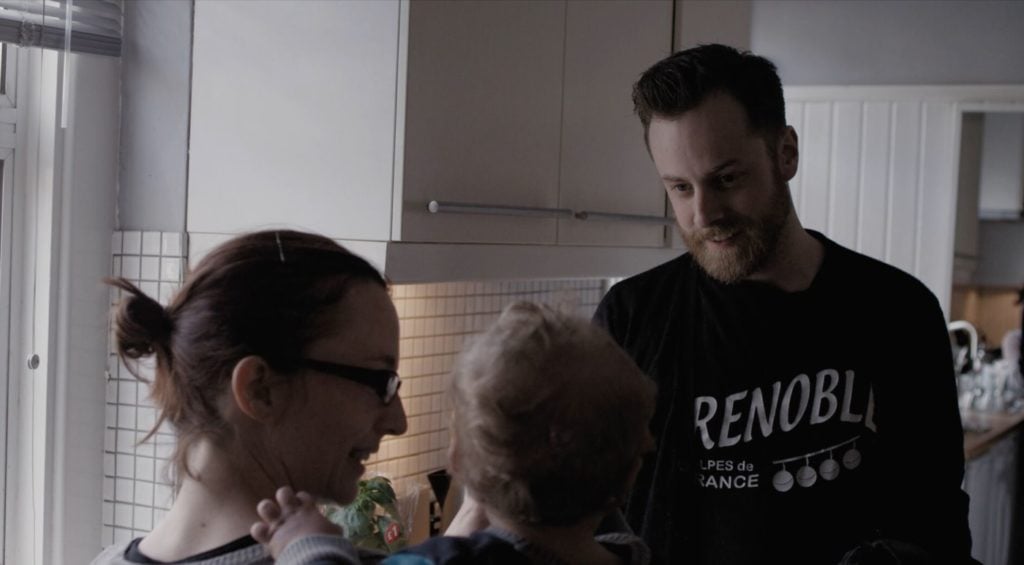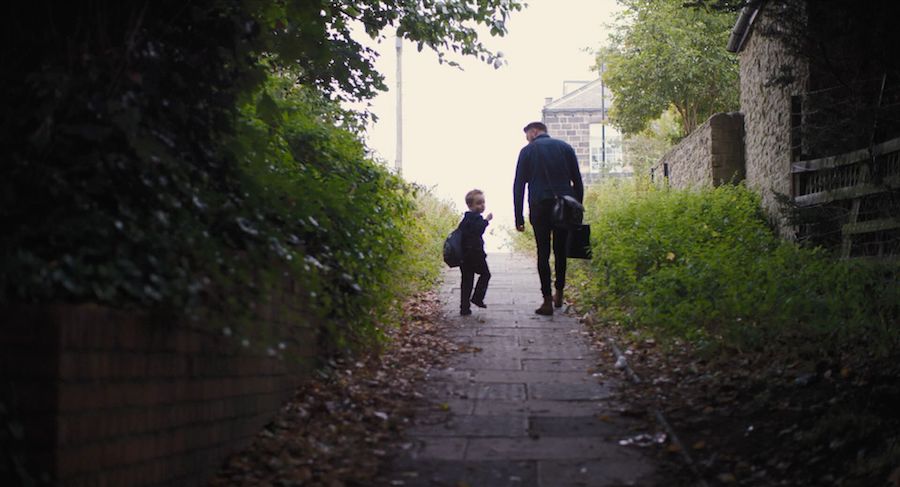I Like Trains on life, progress, and the importance of documentation

The trailer for the forthcoming film about I Like Trains (ILT) begins with singer Dave Martin lifting his child from a bath, his narration discussing tensions between the pulls of being in a band, and general adult living. Having just watched this before we speak, it’s fitting that we have to put our chat back five minutes as the washing machine guy has just arrived and Martin needs a few minutes to chat to him.
ILT formed back in 2004 and were subsequently signed to Dance To The Radio, Fierce Panda, then Beggars Banquet. In 2009, the band created I Like Records, a label to put out their 2nd and 3rd albums. Since that third album, a documentary began to be made about the band, a film that in Martin’s words aims to show “what it is to be a band that isn’t vastly successful”—the strapline is a little less harsh sounding: A film about a band in the middle. For lots of bands, it is this middle space that they occupy: selling records, playing busy shows, but not making enough to pay 4/5 lots of rent as you leave your mid-twenties. The film, A Divorce Before A Marriage, by Matt Hopkins and Ben Lancaster, recently premiered at The Leeds International Film Festival, and this with ILT’s upcoming show at The Brudenell for High and Lonesome festival gets Martin and I chatting.
“We didn’t commission the film, it was the guys that made music vids for us. They approached us and said they’d like to make a documentary, so we said, go away and pitch it to us—last thing we wanted was for it it to be a vanity project.” For many artists, many bands, there is a feeling that they are underappreciated, and any attempt to reframe them as being of more value is something to be seized upon. Instead of a glorification of the band’s successes, then, it’s more about how, as a band get older, Martin says “There are other life pressures, careers and families, that make it difficult and challenging. So it’s about how a band can make that work, what the motivations are, that kind of thing.”
Perhaps it’s this lack of being drawn too close to the sun, to the bullshit of the music industry that has kept Trains (as their name is often abbreviated) going. “We don’t appreciate the trappings of the music industry,” says Martin. “The outlook of our songs is often about these people or things that have happened that are glorious failures, and so I think there’s some resonance. The ultimate goal for us was to make a sustainable career out of making music, but without selling ourselves out and not making the music we want to make. We wanted to do it on our own terms.” But that of course comes at a cost. While there are other Leeds bands of that time that have bought houses from their royalties, and now still grace national TV, ILT still work day jobs.

Martin says: “On the one hand I’m immensely proud of what we have done and the amount of work we put in to do that and the music we made, and on the other, it would’ve been nice if we could’ve taken that step where we didn’t need to worry about the day jobs. But I’m not bitter—you’ll see that in the film.”
In 2005 there was a huge amount of music springing from Leeds, folklore has it that Hyde Park had more bands in a square kilometre than anywhere else in Europe. Whether that’s true or not, everybody was in a band, or was on the door of gigs, or DJing, or designing posters, or just supporting the scene in some way. Okay, not everybody, but enough for it to feel that way. Leeds was recognised as the most vibrant scene in the country for guitar bands, and for a time it felt like the centre of everything. We were in our early twenties, so you’ll forgive that self-centred sentiment. When guitar music went over the cliff, around the same time as Lehmann Brothers did the same, bands were dropped, sounds changed and the Leeds scene, built on guitars, drums, basses, and the like suddenly had something like a collapse of it’s own.
“We were good friends with iForwardRussia, Duels, and still are with lots of those guys, but we also sounded very different to the majority of those. So when people lost interest in the scene, it didn’t really affect us. Because we were one step removed—at least sonically—from that, and it allowed us to carry on.” But what of that scene, I ask. “I was chatting to someone who was involved in DIS at the time about how exciting it was. People in Leeds now, and younger people in Leeds in particular, maybe can’t see what all the fuss was about, and that’s the slightly disappointing thing about it. It was a great time, there was a lot of great music being made, and the live scene was great, but there wasn’t a recorded document of it. There wasn’t that one album that stands up and I can only put it down to production, and what we were doing—we were making records on the cheap and putting them out and that was immediate. But, we had cheap tech and we were using that but it doesn’t necessarily stand the test of time, that production.”
Martin dives off to speak to the washing machine man who recommends putting some towels on a hot wash.

He then dives back into telling me about the importance of documentation. “A scene is only as good as it’s documenters in a way.” This theme recurs: the precious, that which is worth saving, and the sense that, left to it’s own devices, the world could not recognise such things. Instead, it holds up high something of lesser value. It is not the lack of good things in the world, but the documenters, the observers, the critics that fail to properly value. “There wasn’t the producer there to get that down, in a way that Manchester at the end of the 70s—Joy Division had Factory and Martin Hannett. Hannett was vital to that, those records stand the test of time. And that’s sad, that Leeds doesn’t have that. We carried on regardless and got better, but that scene wont go down in history for that reason”.
We discuss the infrastructure that was available to Leeds at the time. The DIY label Dance To The Radio (DTTR) signed and got a band to number three in the national album charts, but when Whiskas (architect of DTTR, and with it a good amount else of the scene we’re discussing) gets The Pigeon Detectives to number three in the charts, who does he ask for advice in Leeds? “It was DIY top to bottom, that was a great thing and we learnt a hell of a lot. It was a steep learning curve for all, we were sat in Whiskas’ spare bedroom packing 7” to Steve Lam and the rest of the world, an incredibly exciting time, but totally DIY and whether it stands the test of time… But DTTR became a very different thing quickly. Whiskas was so busy touring and didn’t have a hands on role anymore, it quickly became about the The Pigeon Detectives which wasn’t necessarily the underground music that would’ve been nice… I have to choose my words carefully here, I have nothing against the The Pigeon Detectives… It wasn’t going to rep Leeds on a critical level”.
And yet, those are the two bands that get brought up by people if I’m out of Leeds, who if they know the Leeds guitar scene of that time, will more than likely mention Kaiser Chiefs and PD, very different to lots of the bands. “It needed their success to get the media to shine that light on the scene, but when that’s what its about, the light dies out… Its not a sustainable vision like a Factory was. They were putting out records that kept moving things forward.”

So what of the here and now, being in a Leeds that is heading towards 2023, the city that has arguably never been so good, in a period of technological development for the world perhaps only rivalled by the Industrial Revolution? “I think its an exciting time. Young people have access to music in a way that I didn’t. If you were into guitar music, that was how you defined yourself. They take great things from everywhere. I’m envious in a way of people starting now… but then there aren’t the same kind of scenes. People will go out clubbing one night, watch a gig the next, watch some jazz another, I don’t know if there are likeminded people coming together in the same way.”
I ask if people are not gathering around other symbols, or ideas, values rather than sounds “… The binding factor? I think that’s happening—a good thing, too—but you won’t see another 2005 in Leeds, 1979 in Manc, but that’s progress, that’s fine… Its an exciting time, lots of people doing good things. I don’t know if everyone’s striving for the same thing, or we’re all conforming to something else—the Hipster culture, the consensus. There are still things that excite me… But they’re more dirty and real.” I ask whether there’s a sense of loss at the modern world, at independent culture of the past and whether modern culture feels like a collection of consumerist sectors. “But masquerading as something alternative… That’s partly what [ILT’s last album] The Shallows is about, technology and its influence on our lives. That record’s 4 years old, it’d be quite different now, things have moved on so rapidly. It’s impacting on more of our lives than before.”
Again, the discussion drifts towards politics and the motivation for writing. “If I did it all again, I think studying politics or history (rather than music) might have been more fulfilling. At the time we started making music, it was all very much observational kitchen sink in songwriting. Everyday mundanities, it didn’t really resonate with me. I didn’t want to write about my life. I was early twenties and didn’t think I had anything to say. I’d read history and there were these people doing amazing things, and often failing or dying, these were stories that were getting forgotten. There used to be a time when people would cherish their history and it would get retold orally, but now people can check anything online.”
I ask whether Martin thinks it was a conscious or non-conscious rejection of an overplaying of everyday life. “There were more important fish to fry than whether or not I got the girl, a kicking against what was happening. A lot of good art needs something to rail against. That was what it was at that point.” As you start a family, is there a realignment of the particular and the universal, that those mundane stories now seem to have a wider meaning? “I guess those two strands have actually merged somewhere, and I guess that’s down to life experience…. I still feel like I sing in character most of the time. But its also much more informed by the things that worry me, its more connected somehow. I pick a viewpoint, not necessarily mine, but it illustrates a point..”
Finally we return to the film, and the recent fundraiser that raised a pretty astonishing £29k. That must be humbling, I say. “Absolutely, and also the money we raised for [second album] He Who Saw The Deep. Those moments when you take stock on what you’ve achieved, these songs you’ve written in your bedrooms, recorded in the practice room, that they have connected with people and for them to invest their hard earned money for that to continue, over and above buying a record. You can’t put into words what that means, but they make you realise its worth continuing on that journey, I suppose.”
And with that we wrap up. Based on this chat, the band and its purpose seem far from a divorce, though it is perhaps in modern speak, at least complicated.
I Like Trains play Leeds’s The Brudenell on Saturday 19th November. Find out more about the film, A Divorce Before A Marriage, at http://adivorcebeforemarriage.co.uk.
Filed under: Music

Comments